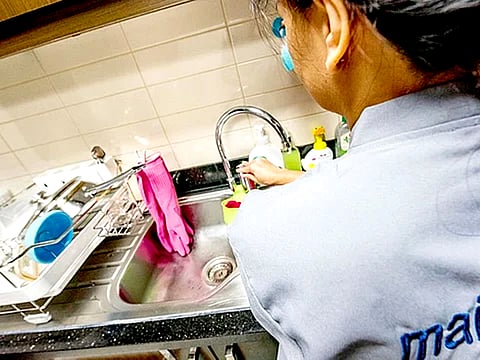UAE outlines 6 legal obligations for domestic worker recruitment centres and 4 for employers
MoHRE aligns domestic worker law with global labour standards and ILO norms

Abu Dhabi: The Ministry of Human Resources and Emiratisation (MoHRE) has detailed six key legal obligations that domestic worker recruitment centres in the UAE must uphold concerning both workers and employers.
It has also outlined four major responsibilities for employers, including salary payments, medical care, and proper accommodation.
Recruitment centre responsibilities
In its Employer Awareness Toolkit for Domestic Workers, published via its official social media channels, the Ministry clarified that all recruitment offices must sign contracts with employers using MoHRE’s approved templates. Recruitment centres must also:
Educate workers about the UAE’s customs and traditions
Inform them of proper complaint procedures
Repatriate workers at their own cost if needed
Provide alternative workers or refund the recruitment fee if a placement fails
Ensure all domestic workers undergo medical checks within 30 days of entering the UAE
Offer suitable accommodation prior to worker handover or in the event of return
Recruitment centres are required to refund full or partial recruitment fees in any of the following cases:
The worker is professionally or behaviourally unfit during the probation period
The worker leaves without valid reason
The employer terminates the contract due to unmet terms
The worker is declared medically unfit
Refund policy for employers
If a domestic worker is found medically unfit within the six-month probationary period, a full refund (including government fees) is required within the first month. For later terminations, a partial refund is calculated as: (Total recruitment cost ÷ contract duration in months) × remaining contract period.
Employer responsibilities
MoHRE has highlighted four major obligations for employers:
Pay all recruitment centre and government fees
Provide the worker’s agreed salary in line with MoHRE rules
Cover the worker’s medical treatment as per UAE laws
Supply required tools for tasks and ensure appropriate accommodation
Annual leave entitlements
Domestic workers are entitled to 30 days of paid annual leave for each year of service, or two days per month for service between six months and a year. If employment ends before leave is taken, workers must receive cash compensation for unused leave. A round-trip air ticket is also provided every two years during leave.
Domestic worker recruitment packages
MoHRE currently offers three packages:
Traditional package: Worker is under the employer’s sponsorship for two years
Temporary package: Worker remains under the centre’s sponsorship with a two-year contract
Flexible package: Worker is under centre’s sponsorship and works hourly, daily, or monthly
Domestic Workers Law
The Federal Law on Domestic Workers ensures informed consent, requiring workers to fully understand contract terms, job roles, salaries, rest periods, and location prior to recruitment. The law covers 19 domestic worker roles and aligns with ILO Convention No. 189 and Recommendation No. 201.
The law strictly prohibits discrimination based on race, gender, religion, nationality, or social origin.
Digital services and legal framework
The UAE government provides digital platforms for:
Licensing and oversight of authorised recruitment agencies
Submitting inquiries and complaints
These services are accessible via the MoHRE website and the Abu Dhabi TAMM portal.
Decree-law on domestic workers
Federal Decree-Law No. 21 of 2023 (amending Decree-Law No. 9 of 2022) governs employment relations for domestic workers. It prohibits:
Hiring workers under 18
Discrimination on any grounds
Sexual harassment (verbal or physical)
Forced labour and human trafficking
Harmful work or duties outside the legal job scope
Employment in unauthorised roles without prior Ministry approval
Sign up for the Daily Briefing
Get the latest news and updates straight to your inbox




